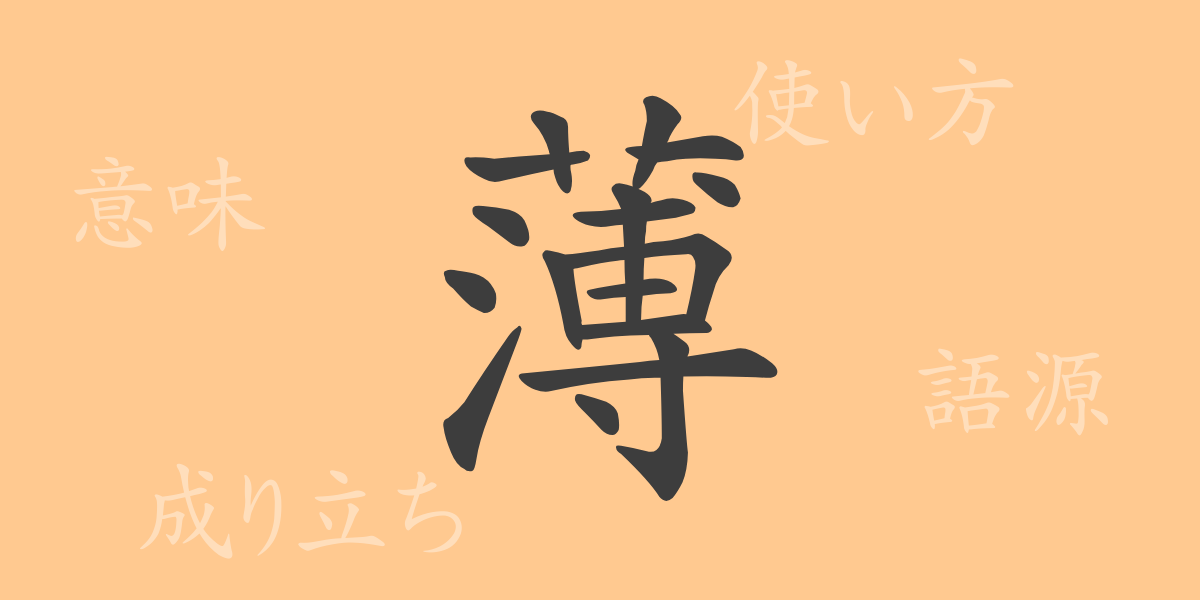The *kanji* (Chinese characters) deeply rooted in Japanese culture hold history and meaning in every stroke. The character “薄(うす)” carries a profound narrative beyond its appearance. It is a common character seen in daily life, but do you know its origin, meaning, and usage? In this article, we will shine a light on the *kanji* “薄(うす)” and uncover its fascinating aspects.
The Origin of 薄(うす) (Etymology)
The *kanji* “薄(うす)” is composed of the *kusa-kanmuri* (艸, grass radical) combined with the character “溥(ふ),” which originally depicted sparse vegetation. In ancient China, it symbolized the sparsely growing plants, which later evolved to convey the idea of “thinness.” Unlike other *kanji* characters with the *kusa-kanmuri* like “草(くさ)” (grass) or “花(はな)” (flower), “薄(うす)” has developed its unique meaning over time.
Meaning and Usage of 薄(うす)
The *kanji* “薄(うす)” signifies “thin,” “dilute,” or “fade.” It denotes something that has a lesser thickness or that is weak in color, taste, or concentration. It can also describe emotions or attitudes that are reserved or subdued. Commonly, it is used in phrases like “薄暗い(うすぐらい)” (dim), “薄情(はくじょう)” (unfeeling), and “薄味(うすあじ)” (bland), indicating its frequent use as an adjective or noun modifier.
Pronunciation, Stroke Count, and Radical of 薄(うす)
The *kanji* “薄(うす)” not only enriches expression but also demonstrates the depth of the Japanese language through its pronunciation and structure.
- Pronunciation: It is read as “ハク(haku)” in *on’yomi* (Chinese reading) and “うす.い(usu.i),” “うす.める(usu.meru),” “うす.まる(usu.maru),” “うす.らぐ(usu.ragu),” “うす.れる(usu.reru)” in *kun’yomi* (Japanese reading).
- Stroke Count: It consists of 15 strokes.
- Radical: It falls under the *kusa-kanmuri* (艸) radical, associated with plants or grass.
Idioms, Phrases, and Proverbs Using 薄(うす)
Many idioms, phrases, and proverbs featuring “薄(うす)” are part of the Japanese language, reflecting Japanese values and cultural depth.
- 薄幸(はっこう): Refers to being unfortunate or not blessed with good fortune.
- 薄氷(はくひょう): A metaphor for a dangerous or precarious situation, like thin ice.
- 薄情(はくじょう): Signifies a lack of affection or cold-heartedness.
- 薄弱(はくじゃく): Indicates weakness or a lack of firmness.
- 薄志弱行(はくしじゃっこう): Describes someone with weak willpower and poor determination.
Conclusion on 薄(うす)
The *kanji* “薄(うす)” expresses more than just physical “thinness” but also embodies various concepts and emotions. It plays a vital role in Japanese language and culture, used to convey subtle nuances. Through this article, we hope you have gained insight into the diverse expressions that “薄(うす)” offers.
This translation preserves the original content’s essence, ensuring it resonates well with English-speaking audiences while maintaining the nuances of Japanese culture and language.

























